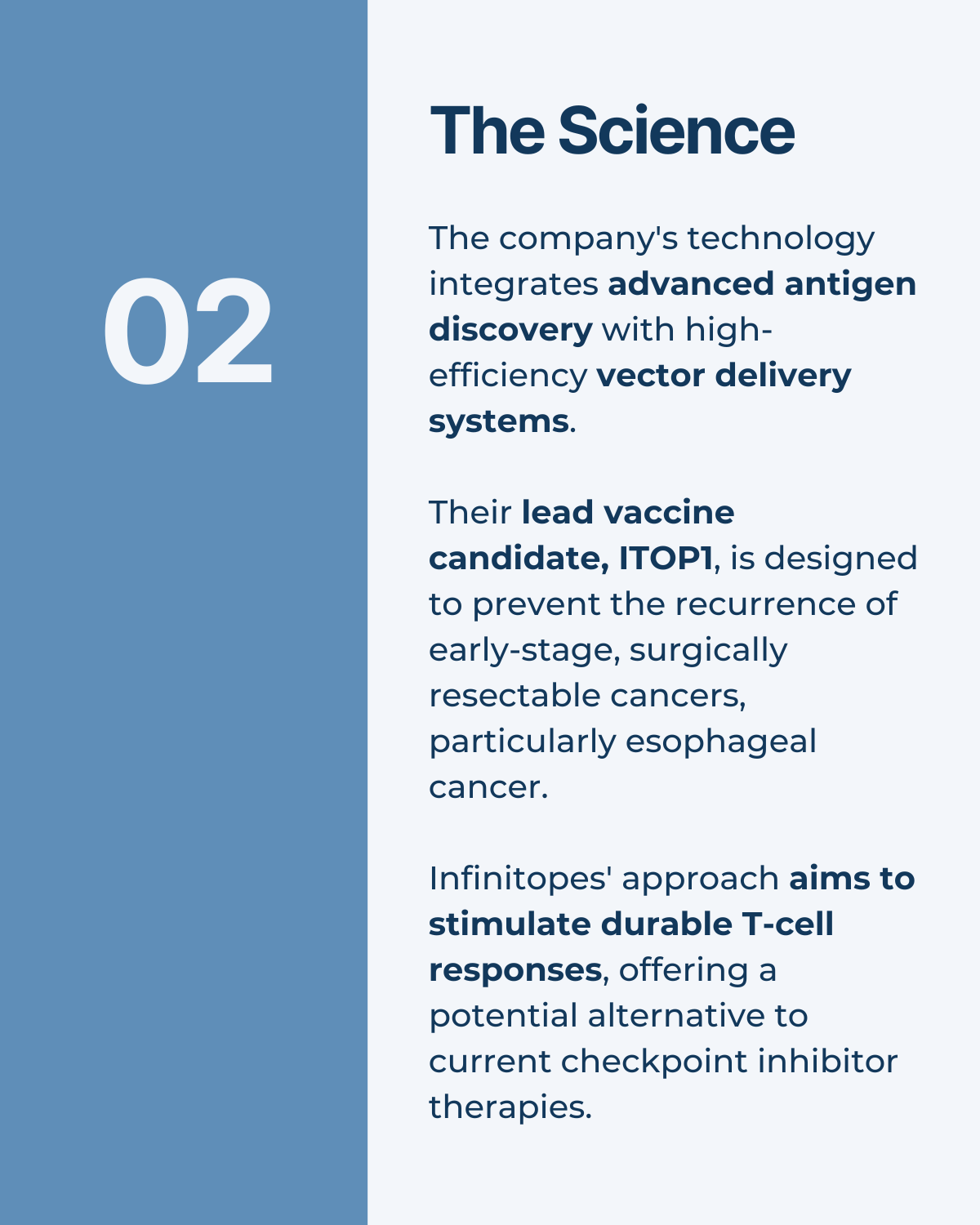🧬 Startup of the Week: Infinitopes
Redefining Precision Cancer Vaccines with AI and Viral Vectors
Hi! Every Friday, I post a carousel spotlighting a biotech — it might be because they’ve made headlines (good or bad), or simply because I want to share more about a smaller, earlier-stage, or lesser-known company that’s doing something truly exciting.
Let me know what you think — and which company you’d like to see under the spotlight!
This week I want to focus on Infinitopes, a biotech emerging from Oxford (UK) that’s worth watching.
Infinitopes: Precision Cancer Vaccines from Antigen to Clinic
There’s been a steady build-up over the last few years around personalised and therapeutic cancer vaccines, but relatively few companies are bringing truly novel platforms to the clinic. This is what makes Infinitopes, an Oxford-based biotech, especially compelling right now.
Founded by Dr Jonathan Kwok, Dr Lian Ni Lee, and Dr Senthil Chinnakannan, Infinitopes is developing precision cancer vaccines that combine AI-driven antigen discovery with custom-built viral vectors. Their focus? Targeting early-stage solid tumours — an area where current immunotherapy options are still limited and often come too late.
The Scientific Premise
At the heart of Infinitopes’ approach lies a seemingly simple but long-standing challenge: how do we identify and target truly cancer-specific antigens with high enough precision to drive potent immune responses without off-target effects?
Their platform uses machine learning to sift through tumour-specific mutations, apply structural constraints to predict surface-expressed antigens, and shortlist epitopes that are both immunogenic and presentable in the context of MHC. This “AI meets structure meets immunology” approach puts them in the growing field of next-gen neoantigen prediction, but what stands out is how tightly integrated this is with their custom vector design.
Chinnakannan’s background in gene therapy and vaccine vectors, combined with Lee’s expertise in immunology from her time at GSK and Pfizer, shows up clearly in how the company is thinking not just about what antigens to use — but how to deliver them with the right dose, kinetics, and innate immune priming.
Momentum Building
Infinitopes has been quietly but steadily advancing across three fronts:
Non-dilutive support: They’ve secured back-to-back Innovate UK grants — first in Cancer Therapeutics, then in the Future Economy Investor Partnership programme — to build and validate their core platform.
Funding: In April 2024, they announced a £12.8M seed round, led by Octopus Ventures, with participation from Cancer Research UK, Cancer Research Institute, and others. It’s a strong vote of confidence from mission-aligned investors, and a meaningful sum at this stage.
Scientific recognition: At SITC 2024, they presented multiple posters on their lead programmes and antigen discovery engine — one of which was recognised in the top 100 abstracts. It’s early days, but their preclinical data appears to show robust CD8+ responses and tumour control in models of oesophageal and colorectal cancer.
Moving Into the Clinic
The real milestone, though, came in April 2025: MHRA approval for their Phase I/IIa trial in early-stage oesophageal adenocarcinoma. Named VISTA, this double-blind, placebo-controlled, neoadjuvant study will enrol patients across four NHS hospitals. The trial will evaluate ITOP1, their lead precision vaccine, in a setting where early immune engagement could meaningfully shift outcomes.
It’s not just a technical step forward — it’s a statement of clinical ambition. Neoadjuvant immunotherapy trials are still rare in the UK, and almost unheard of with novel vector-based vaccines in this particular cancer type.
Why This Matters
What’s exciting about Infinitopes isn’t just their science — it’s the way they’re stitching together multiple strands of innovation into something potentially translational.
If you’re watching the cancer vaccine space closely, you’ll know the field is finally shaking off the memory of underwhelming first-generation approaches. mRNA changed the landscape, but the next wave will go beyond modality hype to deeper biological precision.
So, a few open questions to watch:
Can Infinitopes demonstrate clinically meaningful immune responses in early-stage cancer — where tumour burden is lower but immune tolerance might still be high?
Will their vector approach show advantages over mRNA or peptide-based vaccines, especially in terms of delivery, durability, or manufacturing?
And crucially, can their antigen prediction engine scale up to generate targets across more diverse tumour types and HLA backgrounds?
For now, they’re still pre-revenue and about to start in the clinic, but Infinitopes is building something methodical and ambitious — and doing it with unusually deep cross-functional expertise.
Not every startup trying to make cancer vaccines will get to the clinic. They’re about to cross that line.
Let’s see what comes next.
Full carousel below 👇









